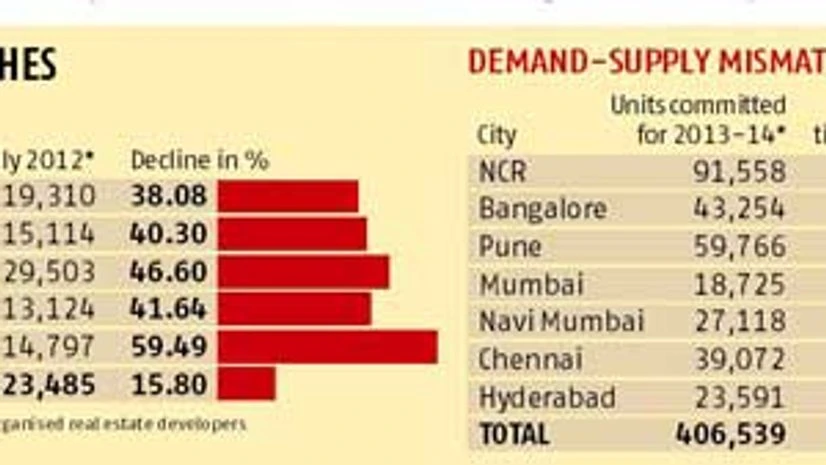After a huge inventory pile-up and delivery setbacks, the numbers for housing launches appear bleak, too, thus firmly establishing the real estate gloom story. Launches till July this year fell by 38 to 59 per cent across key markets such as Gurgaon, Navi Mumbai, Pune, Noida and Kolkata, compared with the same period last year. Bangalore has bucked the overall downtrend by reporting a rise in launches.
The highest drop, of 59.5 per cent, was seen in Noida, with only 5,994 units launched till July this year, down from 14,797 in the same period of 2012. In Gurgaon, launches dipped 38 per cent to 11,955 till July, from 19,310 in the corresponding period of 2012.
Similarly, launches were down 40.3 per cent in Navi Mumbai, 46.6 per cent in Pune and 41.6 per cent in Kolkata, according to data by real estate research firm PropEquity (see chart). Overall, launches across India in 15 major cities were down 15.8 per cent to 188,145 units in all segments till July this year.
Contrary to the overall trend, 36,669 units were launched in Bangalore till July, up from 27,950 in the same period last year, a rise of 31.2 per cent. Whitefield in Bangalore continues to be a highly growing market with luxury and mid-end apartments, along with high-end malls and hotels. "The south is a conservative market, in fact a conscious one as compared to National Capital Region and Mumbai," says Shweta Jain, executive director, residential services, Cushman and Wakefield. This is the reason why developers have a good track record in terms of delivery as well as launches in the south, she says.
"Bangalore continues to be a big IT destination and attracts MNCs. Also, demand for homes from first-time buyers is always there."
Commenting on the overall dip in launches, Sanjay Sharma, Qubrex, argues it is not an alarming situation. "We are going through a slowdown; it is difficult to sell in the market. The enthusiasm of people is down since there has been no substantial increase in prices in the last six months or so," he says. Moreover, builders have lost credibility because of the delay in deliveries. "Many potential buyers are still in wait-and-watch mode as they expect prices to come down... new launches are a direct result of demand," says Sharma.
According to Samir Jasuja, founder and CEO, PropEquity, "New launches have witnessed a sharp drop due to the economic slowdown which has led to a situation of oversupply and slow sales. That is why many developers have deferred launches to manage the demand-supply mismatch."
Developers are currently experimenting with various schemes/offers to boost sales, says an official from a realty firm. But, new supply is controlled at a rationalised price, which is enabling them to offload existing inventories without going for price cuts directly.
Delayed delivery is already a worrying issue for buyers and the industry. Till July this year, of the committed supply of 406,539 housing units, only 143,838 had been completed, which was 35.38 per cent - just over a third. The delays are a result of the liquidity crunch in the industry and the fact that some developers have committed higher than their current execution capabilities, according to experts.
"The festive season is expected to stimulate sales and generate cash flows for developers. We expect the market to bounce back by the third quarter next year," says Jasuja. Transactions are happening much below the asking prices, according to Sharma. "Only desperate deals are happening as of now. But, if the situation continues and the negative sentiment goes on for 9-12 months, there might be a fall in prices."
Corresponding with delivery delays, inventory levels have risen. Mumbai has inventory for close to 48 months, Delhi 23 months and Bangalore 25. This is above the comfort zone of 14-15 months, according to a report by Jones Lang Lasalle (JLL). As a result of the high inventory level, the ability of the market to cling on to current prices is under severe stress, says Ashutosh Limaye, head (research & real estate intelligence service), JLL India.

)
